No More Overtime! How to Escape the Multitasking Trap and Produce Results at Lightning Speed
Back to TopTo reach a broader audience, this article has been translated from Japanese.
You can find the original version here.
Introduction
#"Another day of overtime again..." Are you sighing like that?
Many people are swamped by multiple projects and tasks, unable to break free from a state of multitasking.
You might think, "I have no choice because I'm busy," but that might actually be what's causing your overtime.
In this article, we'll let you experience the "trap" of multitasking through a gamified exercise and explain concrete methods to produce results at lightning speed through single-tasking.
Let's achieve the "No More Overtime!" way of working together.
Multitasking vs Single-tasking
#First, let's explain multitasking and single-tasking.
For example, imagine you have three tasks that each take two days to complete when handled by one person.
Planning Work with Multitasking
#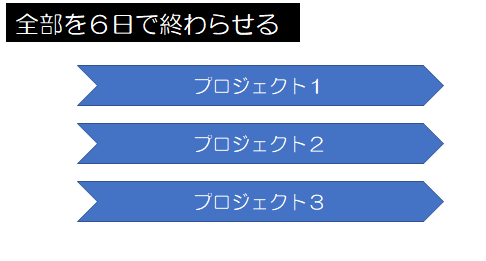
As shown above, you progress on all three tasks in parallel, aiming to complete all tasks in six days.
Planning Work with Single-tasking
#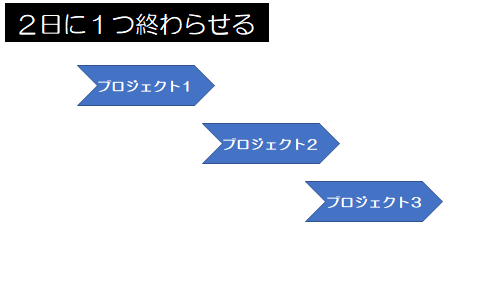
As shown above, you complete one task in two days, then sequentially finish the next tasks, aiming to complete the last task on day six.
Problems with Multitasking Workflows
#Increased Switching Costs
#The "trap" of multitasking.
It's the "switching cost" that arises from running multiple projects simultaneously.
You interrupt one task, switch to another, and then return to the original task.
This seemingly minor action steals a significant amount of time and concentration.
According to Tom DeMarco and Timothy Lister's "ピープルウェア", it takes more than 15 minutes to return to your original level of concentration after switching back from another task.
In other words, repeatedly switching tasks several times a day is the exact opposite of a way of working that delivers results at lightning speed.
By simply switching tasks twice in the morning and twice in the afternoon, you end up wasting about an hour of your day.
What if you're spending that time in overtime...?
More Concurrent Tasks Lead to Delays
#The more tasks you multitask, the more frequently you switch, resulting in decreased productivity.
Also, if you continue multitasking without setting priorities, certain tasks' deadlines may be delayed indefinitely.
Experiencing the Negative Effects of Multitasking Through a Game
#Is it true that as multitasking increases, deadlines will always keep slipping?
Let's use a simple game to experience the challenges of multitasking.
Game Overview
#In this game, you'll experience the differences in work efficiency between multitasking and single-tasking.
Please prepare paper, a pencil, and a stopwatch.
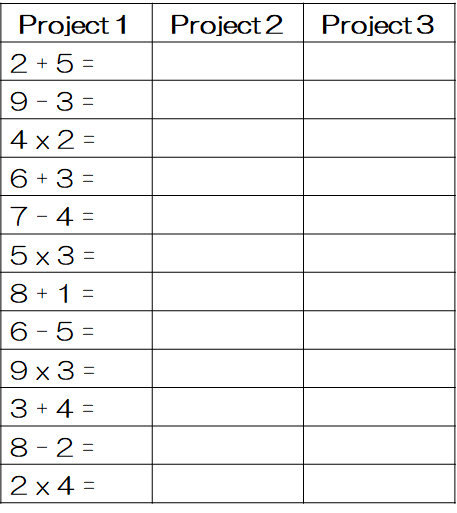
As preparation, create two tables like the ones shown above.
- Project 1: Solve 12 math problems
- Project 2: Draw 12 shapes in sequence (circle, triangle, square)
- Project 3: Write the twelve zodiac signs in order from 'ne' to 'i' in hiragana
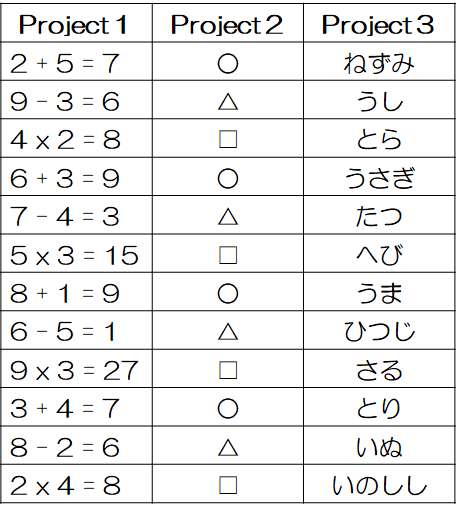
Aim to end up like the diagram above by the end of the game.
Game 1: Multitasking
#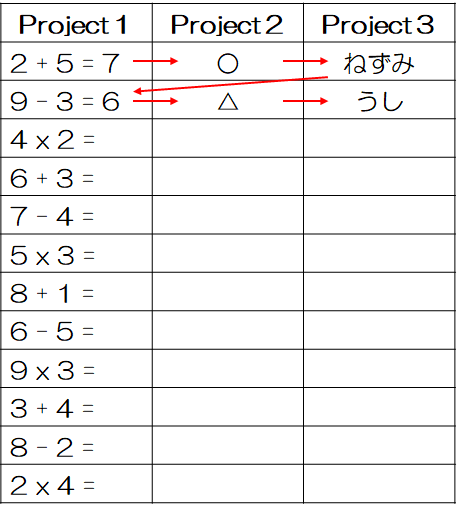
As shown above, follow the red arrows to work on all projects at the same time, writing one row at a time.
Measure the time it takes to finish writing up to the 12th row.
Game 2: Single-tasking
#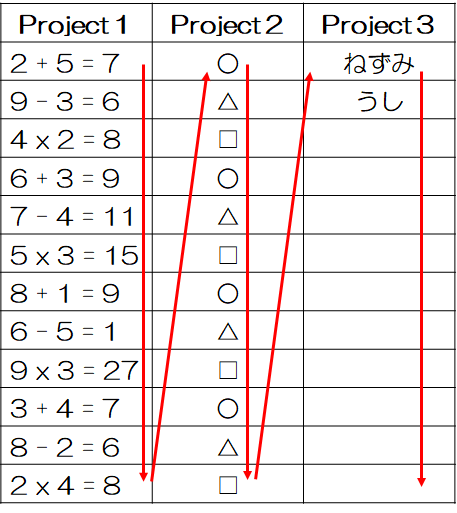
As shown above, follow the red arrows to focus on one project at a time, writing one column at a time.
Again, measure the time it takes to finish writing up to the 12th row.
Game Results and Observations
#How big was the time difference between Game 1 and Game 2?
- Game 1 probably took about 120 seconds or more to complete the writing
- Game 2 probably finished the writing in about 60 seconds or even less
- Additionally, the letters and symbols written in Game 2 are likely easier to read and more neatly aligned than in Game 1
From the game results, the following points become clear:
- Single-tasking is more efficient than multitasking
- In multitasking, switching costs occur, leading to longer work time
- In single-tasking, you can concentrate on the work, which also improves quality
Plan Your Work with Single-tasking!
#
Having finished the game, which method will you use to schedule your work?
Of course, the one on the right, right?!
Strategies When You Can't Avoid Multitasking
#- We're a startup, so we need to handle various tasks at the same time and can't dedicate ourselves to just one project
- Handling tasks common to multiple projects is my responsibility, and I'm the only one in the company who can do it
If, for reasons like these, you can't avoid multitasking, how about trying the following strategies?
List Out Your Tasks
#First, write down all necessary tasks on sticky notes or similar.
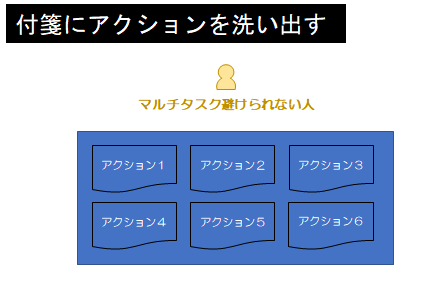
Stack Your Tasks and Focus on the Top One
#Assign priorities and stack the sticky notes with lower-priority tasks at the bottom and higher-priority tasks on top.
Decide that tasks underneath you won't do right now, pick the topmost task, and focus on it.
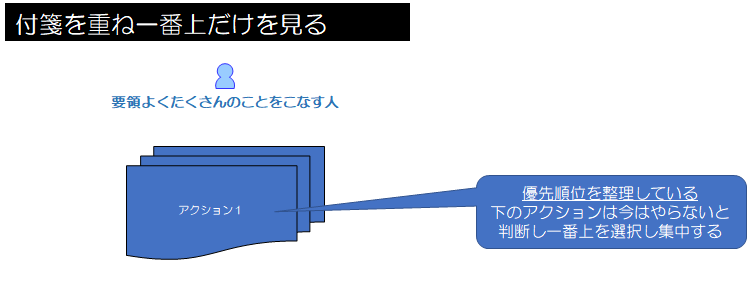
Laying Out All Tasks at Once is a Bad Move
#Affixing sticky notes around your computer display or listing them all out in no particular order is a bad move.
You'll feel overwhelmed by the sheer number of tasks, stress will build up, and efficiency will drop.
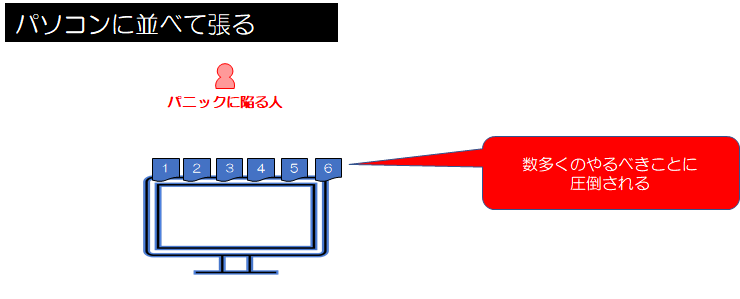
Bonus
#About ten years ago, when I learned about the negative effects of multitasking from websites and books, I remembered my part-time job at a family restaurant during my student days.
While prepping pizza toppings (onions, green peppers, bacon) in the kitchen, I was following a method where I put all three toppings into one dish before moving on to the next dish.
The chef watched me work and said, "If you put onions into all dishes first, then peppers, and finally bacon, it's faster."
When I tried it, it really improved efficiency, and I realized then that I was already being taught the benefits of single-tasking.
Summary
#In this article, we explained how to break free from the "trap" of multitasking and produce results at lightning speed.
By practicing single-tasking, you'll be freed from days of overtime and leaving work on time won't be just a dream.
To make the "No More Overtime!" way of working a reality, please start single-tasking from today.
